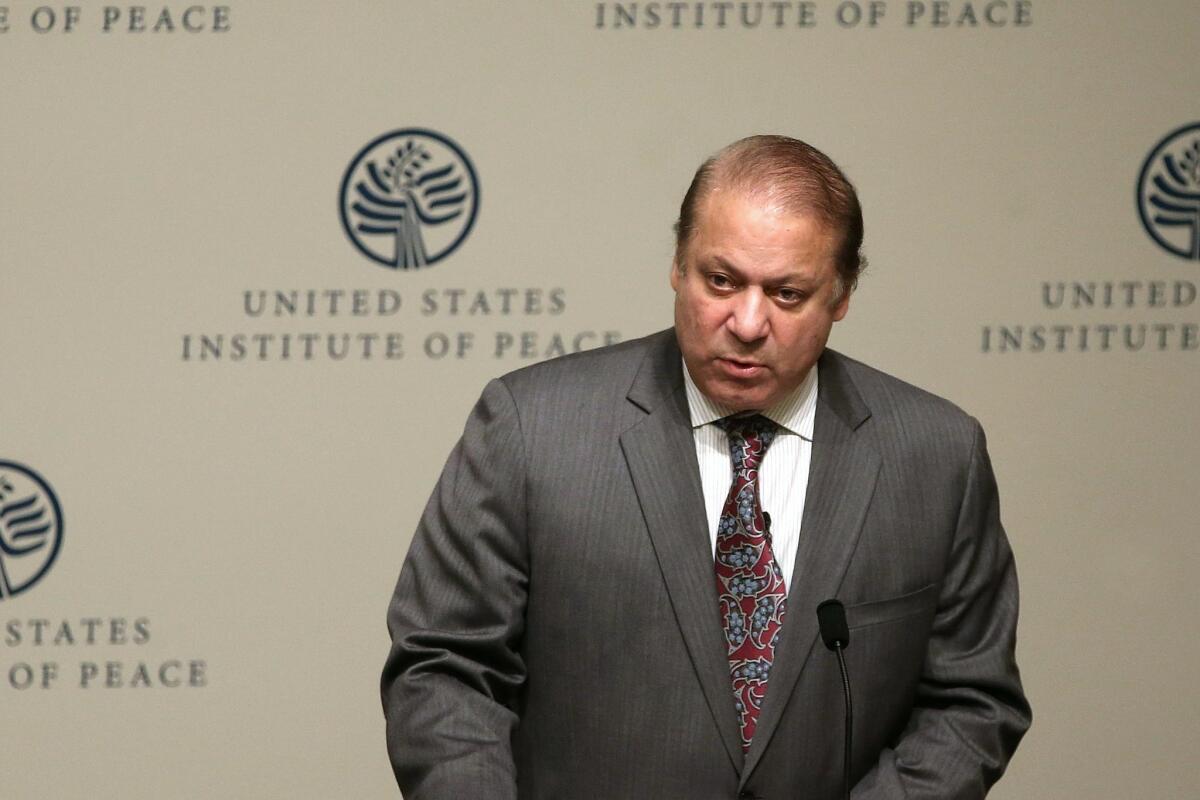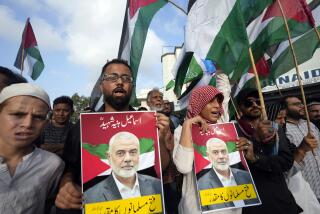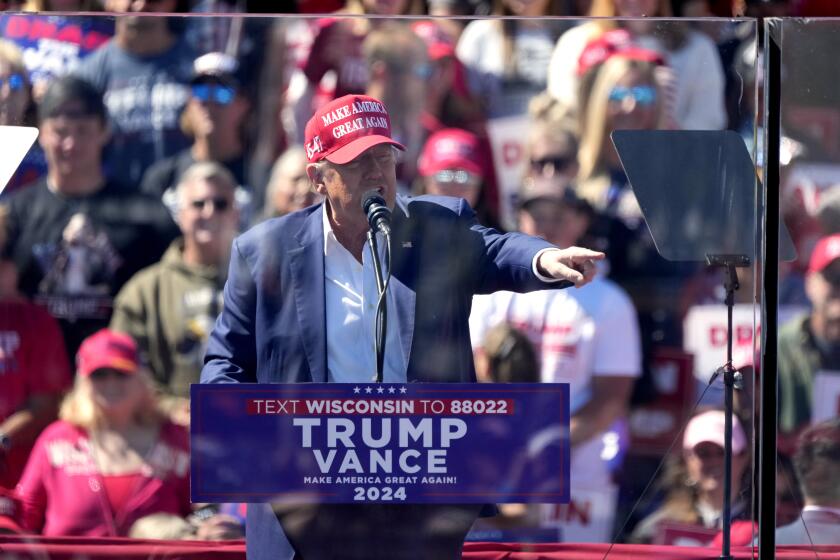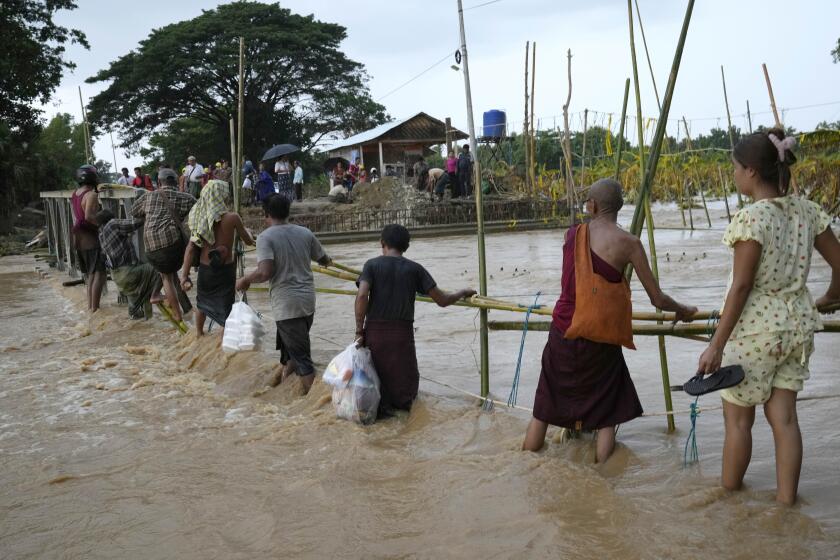U.S.-Pakistan relationship has nowhere to go but up, analysts say

When President Obama and Pakistani Prime Minister Nawaz Sharif meet in the White House on Wednesday for the first high-level contact between their countries in years, there will be plenty to talk about but little on which to agree.
The relationship between Washington and Islamabad has wavered between bad and abysmal for decades, despite common interests in bolstering regional stability in South Asia and fighting terrorism -- what both nations see as one of the gravest threats to their security.
The strains are bountiful: U.S. drone strikes that have killed innocent civilians as well as targeted militants, the Pakistani government’s inability to root out extremists from the lawless “badlands” along the Afghanistan border and blatant violations of Pakistani sovereignty that outrage and embarrass Islamabad, as when the May 2011 U.S. raid on Osama bin Laden’s compound revealed that the world’s most-wanted terrorist had been living under the Pakistani security forces’ noses.
But political analysts say the work to improve ties has to begin somewhere, and the high-profile talks between Obama and Sharif could provide an opportunity for a fresh start.
“There are not going to be breakthroughs or dramatic deliverables, but it is potentially important in that it represents an opportunity to start a process of changing a relationship that has been so bad in recent years,” said Robert Hathaway, Asia program director for the Woodrow Wilson International Center for Scholars.
Obama and Sharif need to build a personal relationship to make any progress down the road in easing suspicions and resentments, Hathaway said, while cautioning that expectations should be kept low, at least at the outset.
“It’s not going to be warm and fuzzy anytime soon, but both Nawaz Sharif and Obama recognize the fact that we do have common interests” in fighting terrorism, ensuring a stable Afghanistan after U.S. forces withdraw and keeping the peace between nuclear-armed foes Pakistan and India, said Hathaway, a former House Foreign Affairs Committee staffer.
Cameron Munter, who was U.S. ambassador to Pakistan in 2010-12 and is now a professor of international relations at Pomona College, attended a speech by Sharif on Tuesday at the U.S. Institute of Peace in Washington and expressed surprise at the “very positive gloss” that the Pakistani leader put on relations with Washington.
“He tried to say that we can put this back on a good footing,” said Munter. “Without trying to take on too much, he was saying we can move ahead.”
Sharif’s arrival in Washington coincided with a new report by human rights advocates Amnesty International and Human Rights Watch saying that U.S. airstrikes in Yemen and Pakistan have killed far more civilians than American officials have acknowledged.
Drone strikes against suspected militants, which are deeply resented by Pakistanis for the “collateral damage” they can inflict, were expected to be high on the agenda for Obama and Sharif, Munter said. He described the discussions as likely to be difficult but “very healthy for that public debate to be taking place at this time,” as resolving differences over drone strategy is a necessary prelude to a broader consensus on how to fight the broader war on terrorism.
Pakistan’s help in evacuating huge convoys of military equipment from Afghanistan through its territory next year will be vital to the security of the withdrawal, Munter said. And common work to compel peace talks between the next Afghan government and the Afghan Taliban could ease fears for the post-2014 future of Afghanistan, when the foreign forces are gone, the former diplomat said.
Obama and Sharif also need to coordinate strategy and diplomacy ahead of major political changes in the region next year, when both Afghanistan and India elect new leaders, noted Daniel Markey, Council on Foreign Relations senior fellow for Indo-Pakistani affairs and author of the just-released “No Exit from Pakistan: America’s Tortured Relationship with Islamabad.”
Markey said he was concerned for the next eight months, when Afghan and Indian political campaigns are under way and the potential for violence and corruption elevated.
But Markey observed that Pakistan’s milestone democratic accomplishment this year -- the peaceful transition from one elected civilian leader to another -- has given rise to hopes that the volatile campaign seasons in neighboring countries could also produce new leaders without the usual disruptions.
With the subcontinent in transition, observed CFR.org editor Robert McMahon, “perhaps it is time to take stock in the region, to see the glass as half full rather than half empty.”
ALSO:
Mexico demands investigation into reports of U.S. spying
Irish authorities take custody of blond girl living with Roma
U.N. review of China human rights record draws clashing accounts
A foreign correspondent for 25 years, Carol J. Williams traveled to and reported from more than 80 countries in Europe, Asia, the Middle East and Latin America.
More to Read
Sign up for Essential California
The most important California stories and recommendations in your inbox every morning.
You may occasionally receive promotional content from the Los Angeles Times.










